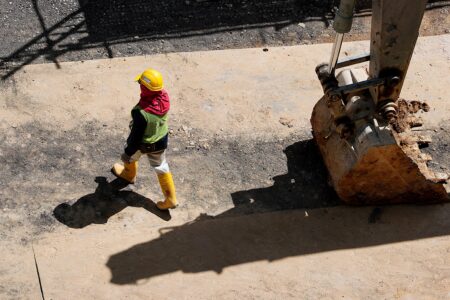Staying healthy during the fall and winter can feel like a challenge.
With conflicting information from the federal government this year, many parents are confused: “Should I or my child be vaccinated for the flu, CoViD-19, and RSV?” “What symptoms should I watch out for, and how are they treated?”
Make no mistake, CoViD-19, flu, and RSV can lead to severe illness and even death.
For example, last year’s influenza season had the highest number of pediatric deaths reported (280) in the U.S. in 15 years. Of those, 89 percent had not received a flu vaccine.
As New York City’s doctor, it is my job to provide you with the best, most up-to-date information. So, let’s start with the basics.
What to Expect This Season
Three of the most common viruses in the fall and winter are CoViD-19, the flu, and RSV.
These viruses mainly spread by droplets that enter the air when someone who is sick coughs, sneezes, or talks. People become sick if infected droplets, mucus, or saliva enter the eyes, nose, or mouth.
Protect Yourself & Your Family
The number one action you can take to protect your health this season is to get vaccinated. Vaccines reduce your chance of becoming very sick, being hospitalized and dying from CoViD-19, flu, and RSV.
Vaccines for these viruses are safe for you and your families. The good news is you can get the flu and CoViD-19 vaccine at the same time. You do not need a prescription. If you qualify for the RSV vaccine, you can get all three vaccines at the same time.
Those at the highest risk of getting very sick from these viruses are older adults, young children, and people with certain underlying medical conditions, like chronic heart or lung disease or diabetes. Everyone ages 6 months and older should get an updated 2025-2026 CoViD-19 vaccine and an updated 2025-2026 flu vaccine, even if they have received these vaccines or had these illnesses before.
Risk Of RSV For Infants & Older Adults
Adults age 75 and older should get an RSV vaccine.
Adults ages 60 to 74 should get an RSV if they have certain medical conditions that put them at increased risk for severe disease or live in a long-term care facility like a nursing home.
An RSV vaccine is recommended for anyone who is pregnant to protect infants in their first RSV season. Infants can also take medicine to prevent RSV before or during their first RSV season during the fall, winter, and spring).
Unlike with the CoViD-19 and flu vaccines, people who have received an RSV vaccine before are currently not recommended to get vaccinated again.
NYC Health Resources
To learn more about which vaccines you or your family needs, speak with your health care provider.
To find a nearby CoViD-19, flu, or RSV vaccination site, visit the NYC Health Map at nyc.gov/health/map.
Many locations welcome walk-ins. We also list a number of places where you can go if you do not have insurance, or are unsure about your insurance status.
If You Or a Loved One Is Sick
Stay home, and take steps to protect others in your household, including wearing a well-fitting mask, staying in a separate room as much as possible, increasing ventilation, cleaning frequently touched surfaces and following good hand hygiene.
Treatment options for CoViD-19 and flu are available. CoViD-19 and flu treatment such as oral antiviral pills reduce the risk of complications, hospitalization, and death. If you test positive for CoViD-19 or flu, contact a health provider right away to see if you are eligible for treatment, as treatment works better the sooner you start.
When feeling ill, it is important for adult and children to stay hydrated. Most people recover on their own or with over-the-counter medicine. Contact your child’s provider if your child has:
- signs of dehydration, such as dry mouth or less urine (fewer wet diapers);
- a fever that lasts more than three days or stays above 104 degrees Fahrenheit (40 degrees Celsius), or any fever if they are younger than 3 months old;
- more fussiness, poor feeding, or sleepiness.
For adults or children with difficulty breathing (in young children, this may appear as rapid or noisy breathing, nostrils flaring or using neck muscles to breathe), a pale or blue color around the lips or mouth, confusion, severe dehydration, or other concerning symptoms, call 911 or go to a nearby hospital.
If you or your child does not have a health care provider, you can:
- visit a nearby urgent care center or clinic.
- check with your insurance health plan to see if they have a telehealth hotline.
- contact NYC Health + Hospitals’ Virtual Express Care at expresscare.nyc or 631-EXP-Care (631-397-2273), where low- to no-cost care is available 24/7 in over 200 languages, regardless of immigration status.
New York City aims to make sure ALL New Yorkers have access to health care. Payment, documentation, and housing status are not barriers to care. Every New Yorker can have access to lifesaving vaccines and health needs, without exception.
Dr. Michelle Morse
Acting Commissioner of the New York City Health Department
Featured image credit: DepositPhotos.com









